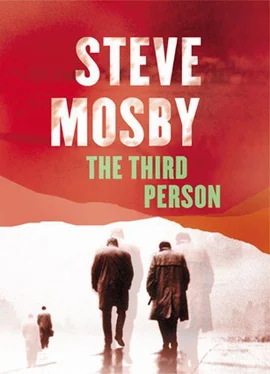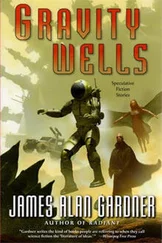Steve Mosby - The Third Person
Здесь есть возможность читать онлайн «Steve Mosby - The Third Person» весь текст электронной книги совершенно бесплатно (целиком полную версию без сокращений). В некоторых случаях можно слушать аудио, скачать через торрент в формате fb2 и присутствует краткое содержание. Жанр: Триллер, на английском языке. Описание произведения, (предисловие) а так же отзывы посетителей доступны на портале библиотеки ЛибКат.
- Название:The Third Person
- Автор:
- Жанр:
- Год:неизвестен
- ISBN:нет данных
- Рейтинг книги:3 / 5. Голосов: 1
-
Избранное:Добавить в избранное
- Отзывы:
-
Ваша оценка:
- 60
- 1
- 2
- 3
- 4
- 5
The Third Person: краткое содержание, описание и аннотация
Предлагаем к чтению аннотацию, описание, краткое содержание или предисловие (зависит от того, что написал сам автор книги «The Third Person»). Если вы не нашли необходимую информацию о книге — напишите в комментариях, мы постараемся отыскать её.
The Third Person — читать онлайн бесплатно полную книгу (весь текст) целиком
Ниже представлен текст книги, разбитый по страницам. Система сохранения места последней прочитанной страницы, позволяет с удобством читать онлайн бесплатно книгу «The Third Person», без необходимости каждый раз заново искать на чём Вы остановились. Поставьте закладку, и сможете в любой момент перейти на страницу, на которой закончили чтение.
Интервал:
Закладка:
‘You wouldn’t know it from looking at him now, but that man there used to be one of the best businessmen in the business.’
The Factory’s where they teach you to write. It’s all they do, day in and day out: nearly five hundred children at any one time, all aged between eleven and eighteen, housed under one long roof and under the nine-to-five tutelage of those who have gone before them. Prospective students are picked out by the Tests at as early an age as possible and then taught the trappings of plot, character and sentence structure before graduating: turned loose into the world as novelists of potential note, standing and bank balance.
He never stood a chance, of course. He couldn’t do plot and character: he just couldn’t abstract things in that way. Didn’t even want to. What he did was take a snapshot of an event and put it in your head. When he tried to put strings of events together, or create characters, it just didn’t work; the law of ever-decreasing returns applied, and each successive scene became duller and duller. The longer and longer he spent at the Factory, the emptier he felt. His time there was hollowing him out – turning him into a shell they could fill – and pointing him, by force, in a direction he just didn’t want to go.
It was never going to last.
Things came to a head four months after he’d arrived, but by that time he’d had a whole bunch of run-ins with the staff and was just waiting for an excuse. It came during James Thornton’s Commercial Viability class, in which the man explained the rules of publishing to a class of twenty enthralled would-be writers, and him.
‘Writing is purely and simply a business,’ Thornton repeated.
In fact, Thornton simply couldn’t stress that enough, and he hated the man more every time he said it. Not for him, it wasn’t. Not ever.
‘A business. That’s all. You have to approach it in that manner, or you’ll fail. You’ll be a nobody. Nothing. Not a writer, anyway – that’s for damn sure.’
Thornton had a moustache and the kind of confidence you get from a string of successful relationship novels, but he couldn’t swear for shit. He said damn too slowly: rolling it around and drawing out tension that simply wasn’t there. A girl at the front tittered appreciatively. Thornton was pretty famous.
He went on.
The gist of it was this. Fiction is business, and publishing houses aren’t always likely to risk investment on an untried, untested author. Even if they did, and you got your book published, there was no guarantee that you’d actually sell. A stamp of approval from the Factory gets you halfway in life; marketing takes you that little bit further; but smarts get you the rest.
‘Once you’ve got your foot in the door,’ Thornton said, leaning on the desk in front of him with his shirtsleeves rolled up to the elbows, ‘act quick. And act smart. Your book is out. What do you do? What you do is approach your bank and take out a business loan, and then you scour. You scour the country from end to end, and you buy up every copy of the book you can find.’
He stood up, staring at a few of them in turn.
‘And that’s it. The publishing company says “Wow”, and offers you a contract on the spot. Hundreds of thousands of pounds flutter down into your pockets as if by magic. As much goddamn dental work as your mouth can cope with. And when they put your second book out, they market it so hard you don’t even have time to breathe. You’re in.’
A boy at the front had his arm up straight as a flag pole. ‘Is that what you did, Mr Thornton?’
Thornton leant on the desk again and showed the boy his teeth: perfect and white.
‘We’ve all done it, son,’ he said. ‘We’ve all done it.’
Two weekends after that, he went back home and saw Kay, who he missed now he no longer sat next to her in class. He was slightly relieved to see that she missed him right back. They made love a couple of times, and he took her for drinks in the café they’d had their first date in, which felt like an age ago. It was a sunny day, and he took his notepad and jotted down descriptions of the trees, the people and the lake, surprising her with them as they walked – giving her little linguistic trinkets to remember him by. She folded each one up carefully and placed it in the pocket of her jeans, giving him a secret smile in exchange. The Factory had never felt so irrelevant and far away.
They talked about their future together and, as they did, he could feel it solidifying. The prospect felt far more real and important than anything he’d ever write down in a notebook, or sell for a million.
And he was thinking – as they crossed the road, with her a little ahead of him, dragging him by the hand – and then she was just suddenly taken away. His right arm jolting, and he lurched: spun a little. The side of a truck flashed in front of him; a strong waft of air; a screech of tyres. Then, the truck was past, skidding to a halt, and he was left standing there, staring at the other side of the sunny street, his arm beginning to throb. The face of a woman standing beneath a green plastic canopy opposite slowly contorted into a scream of shock, and he blinked at her.
In his left hand, he was still holding his notebook. His right was empty.
They start to put the girl’s body into bin bags, and Long Tall Jack heads off for a shower. He’s coated with blood from his knees to his abdomen, and from his neck to his nose, so he really needs one. They’ll blast down the shower later. Of course, he’s worn gloves the whole time – they all have – but they’ll wipe the place for prints, as well.
He holds his right hand at the wrist and cracks it gently. Then, he flexes his fingers and thumb, working the cramp out of them. One of the crew pulls the girl off the bed by her arm, and her dead eye tracks the ceiling before the rest of her follows.
He looks away.
Marley will copy the text and then send it off. And it was good work today. Today, he just let himself fall into it and he’s still on a high. There’s something a little like joy fluttering in his heart, even though he’s also very sad. It is always like this, and he half hates it, half loves it.
He allowed himself to be washed along by the grief. He used it as a tool to lever himself into movement, the way a shoehorn slides your foot into the shoe and then you’re ready to go outside.
The day before the funeral, he packed. He took the bare minimum and squashed it down into as small a rucksack as he could find. He had his pen, and enough money to buy paper and food, and figured that he could always sell surprising snippets of writing to tourists and make a few dollars here and there if things got tight. What was more important was the overall picture. He was going into the desert to temper and forge his talent: to beat it into something he could feel the edges of, like hammering out the metal walls of a hut you’re going to spend the rest of your life sheltering inside. Everything else felt empty and small.
The last thing he did, before leaving for the funeral with the bag on his back, was address the package to Jim Thornton. He wasn’t even sure why he did it – only that it seemed to give a sense of closure to a period of his life. ‘Here,’ he was saying, ‘this is what I think of you and your fiction; this is what I think of you and your attitude; this is what I think about you and my life.’
I can do something a hundred times bigger than you.
The package contained a description of heartbreak so pure that it would reach off the page and turn a man inside out: destroy him; ruin him. A thousand fashionable romance novels, with all their relationship difficulties and tragedies, would be like a matchstick to the sun beside this text. It was possible that you’d read it and never be able to set pen to paper ever again. It would always be on your mind.
Читать дальшеИнтервал:
Закладка:
Похожие книги на «The Third Person»
Представляем Вашему вниманию похожие книги на «The Third Person» списком для выбора. Мы отобрали схожую по названию и смыслу литературу в надежде предоставить читателям больше вариантов отыскать новые, интересные, ещё непрочитанные произведения.
Обсуждение, отзывы о книге «The Third Person» и просто собственные мнения читателей. Оставьте ваши комментарии, напишите, что Вы думаете о произведении, его смысле или главных героях. Укажите что конкретно понравилось, а что нет, и почему Вы так считаете.












